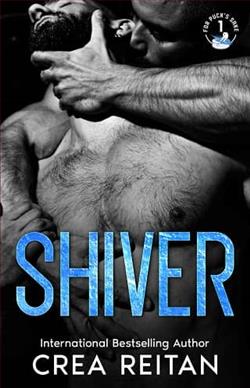Page 122 of Boleyn Traitor
‘D’you think she might get with child?’ she asks me. My heartplunges at the thought that for the first time, I think the answer might be ‘yes’.
‘There’s no reason why not,’ I say firmly, denying the reality of an ill-tempered, sick man who wants to be a father at fifty.
‘It’s the only thing that would make him happy,’ Lady Russell says ambiguously.
This is a woman who reported to Thomas Cromwell just as I did. She learned spy-craft from him, as I did. She knows how to hear meaning in silences, what words would fill the gaps in conversation. She can make a casual comment and note the reply – just as I do.
‘Yes, she delights him.’
‘And in the future – would she be kind to Lady Mary...?’ She lets the question trail off.
I could smile that we once thought the Spanish party was defeated and Lady Mary’s last defender dead. Yet here is another, quietly working for her. ‘The queen loves all her stepchildren,’ I lie.
‘Would she speak against a French marriage for Lady Mary?’ she whispers. ‘I know Lady Mary would rather stay in England than be sent abroad. And she would be a good stepdaughter to the queen if she could stay?’
I see, this is how it will be for me; I will be the advisor behind the throne of the widowed queen. I will keep the balance between the Spanish party for the old faith and the reform party for the new. Kitty – who could not care less either way – will be guided by me, so that we gain the most power and benefit from whichever party is on the rise.
‘Are you sure that is Lady Mary’s wish?’ I ask. ‘Did she ask you?’
She is far too well trained to name her principal. ‘We who love her must wish for her to stay in England,’ she says carefully. ‘We would not want her to go to a country like France, without friends. But I fear that some of the king’s advisors do not think of her happiness.’
‘Oh we do,’ I say reassuringly, wondering how long it will take for my words to reach Toledo. ‘The queen is the best stepmotherthat Lady Mary could have. If she were crowned queen, she would take Lady Mary as her first lady and most beloved daughter.’
And that’s our price for Lady Mary to stay in England! – I could almost laugh aloud. That’s your stake in this gamble! You support Kitty’s coronation, and her inheritance as dowager queen and her position as queen regent, and in return we will prevent Lady Mary’s exile now and we will see her restored to the line of succession after the prince.
Cromwell-trained, Lady Russell betrays no pleasure that we have made an agreement.
‘I am so glad the weather has been so fine for your visit,’ she says.
‘The queen has enjoyed your gardens and parkland,’ I say. ‘A most beautiful setting for a beautiful house.’
Kitty impresses me in these last days of the progress at Chenies. I start to imagine her as a young dowager queen. Exquisitely dressed in her hunting costume, she stands beside the king as he sits on his bowman chair and shoots deer that are driven towards him, and her pity for the terrified creatures and her disgust at their agonising deaths never crosses her pretty face. She does not mount her horse until the king has been hauled into his saddle, so that she is never above him, looking down, so that he never feels that he is old and slow. She never shows a moment’s impatience when the horse staggers under his weight, when he is pale and bad-tempered, she says that she is tired, how exhausting the day has been! She only dances when he asks her to lead out the dancers, and even when the music sets everyone’s feet tapping and the man she adores is on the floor with another girl, she sits beside the king and tilts her head to hear his new complaint over the poor quality of the music, and how he was the best dancer in England.
When he comes to her bed, dragging his stinking leg, she smiles in welcome and ignores the men who help him mount into the high bed. She looks straight past Thomas Culpeper as he gently lifts the king’s bandaged leg, and she smooths the richly embroidered coverlet over the mountain of the king’s belly and does not turnher head, not even by a fraction of an inch, from the stink of his rasping breath.
She knows as well as I do, that if she and Culpeper happened to make a child on that one, irresistible time, then she has to bed the king for the rest of this month, so that he thinks it is his. Culpeper’s seed has to be followed by whatever the king can squeeze out, so that any baby can be named as royal. I don’t have to tell her this. These are the politics of the stable-yard, of the hound kennel. This is about breeding, not love. It is dirty and ordinary and unconcealed, and we set to it like kennel masters.
As we call at Windsor on the way to Hampton Court, I think: we won’t have to do this for long; the king is dying by inches. Every day, he does less; all he maintains is his enormous appetite, and as he belches and farts and sweats from every pore, it looks as if his digestion is breaking down, too, and foul juices and stinking gas are oozing out of his skin.
I think of the Seymour expectation of a regency in the spring, my alliance with Thomas Seymour, of the promise from Lady Mary’s supporters and the Spanish party to support Kitty, of the Howard army that is quietly mustering more men, and I know I am prepared. I really doubt that the king will get through Christmas. Kitty will be widowed in the new year.
Hampton Court, Autumn
1541
WHEN WE HEARof the death of the king’s sister, Margaret Tudor the Dowager Queen of Scotland, I think it is an omen for her brother, our king. Margaret was his senior by only two years, the nearest in age of the family of four, the one most like him inher impulsive defiance and relentless optimism. Now, he is the only one left of the four Tudor children – the last living child of Henry Tudor, the self-made king.
Surely, he must feel this! He must have a sense of his generation passing, of his own mortality. But he does not even order the court into mourning; we do not wear black for the last Tudor princess of her generation. He hugs his anger to himself and denies death, as he always does. He cannot forgive her son’s snub at York, or that she kept Scotland proud and independent when she was queen regent. He blames her for dying – for bringing the thought of death into his mind where even to speak of his death is illegal. In life, he envied her as a rival Tudor. In death, she is immediately forgotten. Nobody even remarks on the loss of Princess Margaret Queen of Scotland; except her daughter, poor Lady Margaret Douglas, trapped at the court of a vindictive uncle, still unmarried, still courting Charles Howard in secret in hidden corners.
She will get little comfort from him. Charles Howard is a young man with a light heart and a lighter understanding. In her secret grief for her mother, Lady Margaret turns to her friends, the princess Lady Mary, and Mary Howard; and the three of them refuse to dance for a week and absent themselves from hunting to pray for the soul of the Tudor queen. The ladies of the queen’s room wordlessly give Lady Margaret field forget-me-nots, stems of rue, and little silver crosses. We all know that there is to be no word spoken at the Tudor court; but we sorrow with her.
Nobody even asks why the death of a royal queen should go unmourned, unrecognised by her home court. Nobody asks why we cannot speak of death. But I believe it is the conundrum that my father identified: how shall a man completely absorbed in himself ever imagine that he could be no more? How can a man who imagines himself as half a god think of his own mortality? How can a man, so vested in his material life, so heavily corporeal, imagine the death of that thick body?
The king cannot grieve for his sister; he cannot even acknowledgethat she is gone. When someone he loves has died, they have – for him – abandoned and betrayed him, and the only way he can bear their loss is to persuade himself that they were never really there at all.
As if to insist that he is a young man, not an old one and the last of his generation, as if to be as young as his child bride, the king declares that instead of a service of mourning for his dead sister, we will hold a service of thanksgiving for his young wife. To make it blindingly clear that he is not thinking of the sister he has lost, he chooses All Hallows’ Eve to celebrate his young queen – as if her youth and beauty can exorcise ghosts.
‘Is he going to announce my coronation?’ Kitty asks me urgently, as she dresses in one of her progress gowns of cloth of silver. She will wear the gown with Tudor green sleeves and a green hood. ‘Is he? And what should I do? What do I do when people give thanks for me? Is it like a toast – do I return it and say a prayer to reply to them?’















